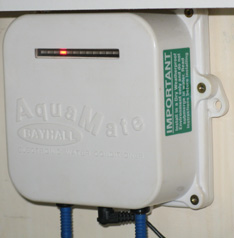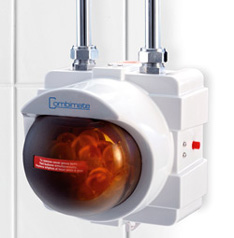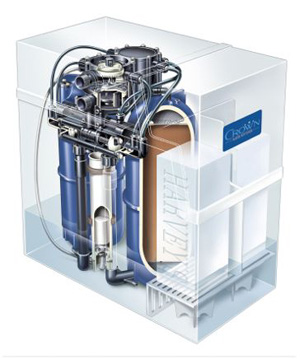 |
| Central Heating Consultants |
Water Treatment & Water Softeners Having experienced the damage corrosion can do within a central heating system if it has not been cleaned properly and had an adequate amount of corrosion inhibitor added, we thought it might be helpful to devote a page to the various types of water treatment available to help counter the damaging effects of lime scale that are present in the water supply in hard water areas such as Basingstoke. .
Having experienced the damage corrosion can do within a central heating system if it has not been cleaned properly and had an adequate amount of corrosion inhibitor added, we thought it might be helpful to devote a page to the various types of water treatment available to help counter the damaging effects of lime scale that are present in the water supply in hard water areas such as Basingstoke. .Electronic Water Conditioner: The simplest way to try and combat the damaging effects of lime scale is the water conditioner. These units use either electric pulses or magnetism to alter the molecular structure of the supply water. The pulses these units input into the supply water encourage the lime scale and magnesium to stay in suspension rather than adhere to the inside of appliances and water storage units. Having previously tried one of these units over a two-year period, we found the difference in scale around taps to be minimal. We also found that shower heads for example still blocked up. Therefore, our conclusion is that whilst these units do have some effect in reducing scale deposits, the effect is minimal. Our unit is an inexpensive one, whether the dearer ones perform any better we do not know. Polyphosphate or Siliphos Dosing Vessel: Another method used to combat water hardness is a known as a Polyphosphate or Siliphos dosing vessel. These units work by introducing a small dose of a food grade chemical (Siliphos) to the water supply. This additive keeps the scale producing elements in suspension at higher temperatures thereby allowing them to pass through rather than adhere to the inside of appliances. These units are primarily designed to help protect units such as combination boilers and thermal store units that draw in cold water that is heated on demand. They are not designed to protect conventional systems that store heated water because the basis they work on is suspension of scale whilst within moving water.  E.G. If water treated with Siliphos is left in an appliance, whether this is a water storage cylinder, a kettle or a showerhead, the Siliphos will leach out into the water, thereby allowing the scale producing elements to settle within the appliance.
E.G. If water treated with Siliphos is left in an appliance, whether this is a water storage cylinder, a kettle or a showerhead, the Siliphos will leach out into the water, thereby allowing the scale producing elements to settle within the appliance.Two further points also affect these units. Whilst one manufacturer of these units states that a separate untreated drinking water supply should be retained, another manufacturer states that an untreated drinking water supply is not necessary?. The second point is that, as far as we are aware, all manufacturers state that the unit should be fitted at least 450mm away from a heat source and ideally should not be located in an area that has a high ambient temperature. This can cause problems with some installations. Ion Exchange Water Softeners:An ion exchange water softener, commonly known as a water softener, is the only water treatment method detailed here that actually removes the scale producing elements from the water supply, thereby allowing the delivery of “soft water” that does not leave scale deposits. It is also the only treatment method that will remove existing scale from pipework and appliances, Including the accumulated scale within the hot water cylinder.These units work on the basis of ion exchange. The supply water enters your property as “Hard Water”, complete with its scale producing elements. It then passes through a resin bed that removes the scale producing elements, allowing non-scaling “Soft Water” to be delivered to your various appliances. When the resin bed requires cleaning, with this being sensed either through a simple timer, or on the better models, determined by the amount of water used, the unit “Back Feeds” a salt water solution through the resin bed, thereby removing the accumulated scale deposits. 
The Cost Effective SolutionWater softeners come in different shapes and sizes, are either electric or non electric, have either single tanks or twin tanks, take block salt or tablet salt and are regenerated by either a timer or a flow meter. A few large capacity units also have a separate salt storage tank. The thing they all have in common is that they receive a hard water supply and produce a soft water supply.Pictured opposite is the Crown block salt softener. This model has twin tanks thereby allowing a softened water supply even when the unit is regenerating. It is supplied with an accurate water meter to ensure that it only regenerates when sufficient water has been used and is one of the models that does not require an electric supply. It also has the added advantage of using Block Salt, which makes this unit far easier to re-fill and the spare salt far easier to store. This unit, in our opinion, represents the ultimate value in both cost and performance. Water Softener Benefits Include:
In conclusion we would like to clear up a commonly held myth. Whether you heating system is filled with “Hard Water” or “Softened Water”, if you do not have an adequate amount of corrosion inhibitor in the system, It will corrode. |
| For Help & Advice regarding heating problems & water treatment solutions call Basingstoke Powerflush on |
| 01256 844344 |